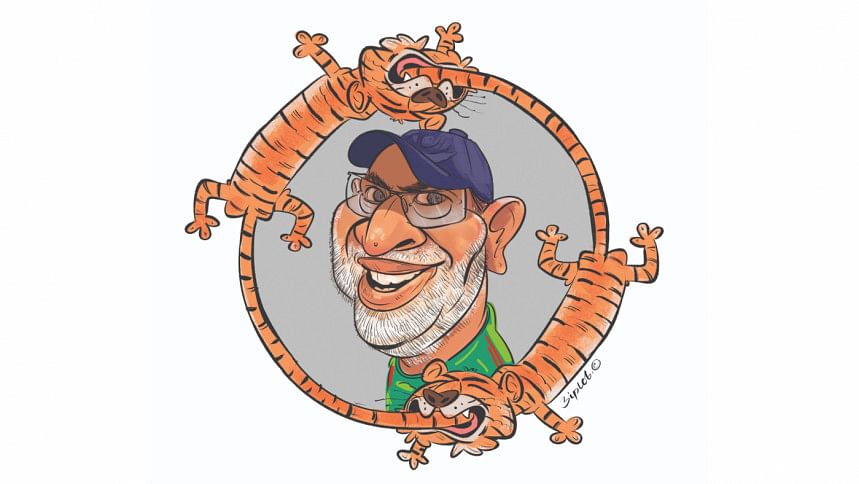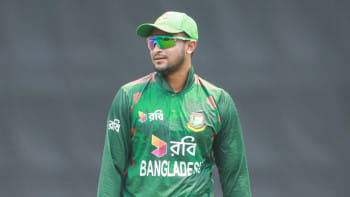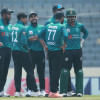Will Hathurusingha continue receiving free pass?

"We win as a team, we lose as a team," is a cliche that members of the Bangladesh team often resort to while reading out from their age-old scripts, explaining disappointing losses.
If that is indeed the case then the team management spearheaded by head coach Chandika Hathurusingha should be taking a share of the blame for Bangladesh's plight. The Tigers hit a new low when they lost a T20 World Cup build-up series against the USA -- an associate nation ranked 10 places below the Tigers.
While the fact remains that the kind of cricket the current Bangladesh side has been playing in the lead-up to the T20 World Cup can be deemed abhorrent and at times inexplicable, Hathurusingha's role in the mess could also be brought into question.
When so much credit is given to the coaches when the Tigers are on a good run, why should they evade criticism when the same side fails to show signs of life?
Renowned coach Mohammad Salahuddin, in an interview with The Daily Star, pointed out that the coach has little to do when the team does well but when things go south, the coach has to take responsibility and work his expertise to nurture the players, solve the puzzle to pull them out of a slump.
More than a year into his contract, Hathurusingha has seen both sides of the coin. In 2023, Bangladesh whitewashed 2022 T20 World Cup champions England, and Afghanistan, won a series against Ireland at home and claimed their maiden T20I win over New Zealand in the BlackCaps' backyard. But less than a year since enjoying their best ever run in the shortest format, the Tigers spiralled down to their lowest point, displaying a severe lack of continuity.
Shouldn't the coach be held accountable for a lack of foresight that saw Bangladesh back to square one?
When Hathurusingha was re-appointed to the head coach role last year, it was expected that the Sri Lankan, who has been known for his authoritative style of management, would be able to restore stability and architect great wonders for Bangladesh.
Instead, it is during his reign that the frosty relationship between Shakib Al Hasan and Tamim Iqbal came to the fore like never before, disrupting the harmony of the side in all formats. The fallout between Tamim and Shakib is nothing new in the Bangladesh cricketing fraternity and was bound to be laid bare in public at some point – preferably after they had ended their careers -- shouldn't Hathurusingha take some blame for not being able to manage two of the greatest egos in the country's cricket?
Heading into another major event, this time the T20 World Cup in the USA and the West Indies, things look a lot bleaker for the men in red and green.
A pivotal figure of the team, mainly responsible for designing game plans and 'man-managing', Hathurusingha could also be blamed for failing to set the tone of the type of cricket the Tigers played in successive series against feeble Zimbabwe and USA.
Bangladesh Cricket Board (BCB) has opted for far more drastic steps while changing the management – including the sacking of coaches at times. But when it comes to Hathurusingha, the board seems reluctant to demand accountability.
Is it that the BCB is deliberately not pointing fingers at Hathurusingha as it would eventually bring the board in the firing line?
It can be argued that the 54-year-old Sri Lankan has struggled to impact improvements in players and often to bring out the best in them. Sure, it is a player's fundamental duty to be concerned about upgrading himself but that aspect also has to be complemented with the guidance of the coaches.
In Hathurusingha's second stint, he has backed the likes of Liton Das and Soumya Sarkar almost unconditionally, but only to see the duo disappoint time and again.
Particularly, in Liton's case, could it not be said that his continuation in underperforming was aggravated only because the Hathurusingha-led team management failed to realise when to drop the classy right-hander and when to have him return to the national side?
The argument from the team management has always been that Liton is "just one innings away from regaining his form" as if he would be able to just go out there and magically get his head sorted enough and not throw his wicket away by playing three successive scoops like he did against Zimbabwe.
When defining a coach's role or considering his impact, Hathurusingha's shortcomings in extracting the best out of his players are in stark contrast to what former fast-bowling coach Otis Gibson and Allan Donald did to produce Bangladesh's best-ever pace unit.
Unfortunately, in this regard, Hathurusingha's efforts are yet to be reflected through his team.

 For all latest news, follow The Daily Star's Google News channel.
For all latest news, follow The Daily Star's Google News channel. 










Comments